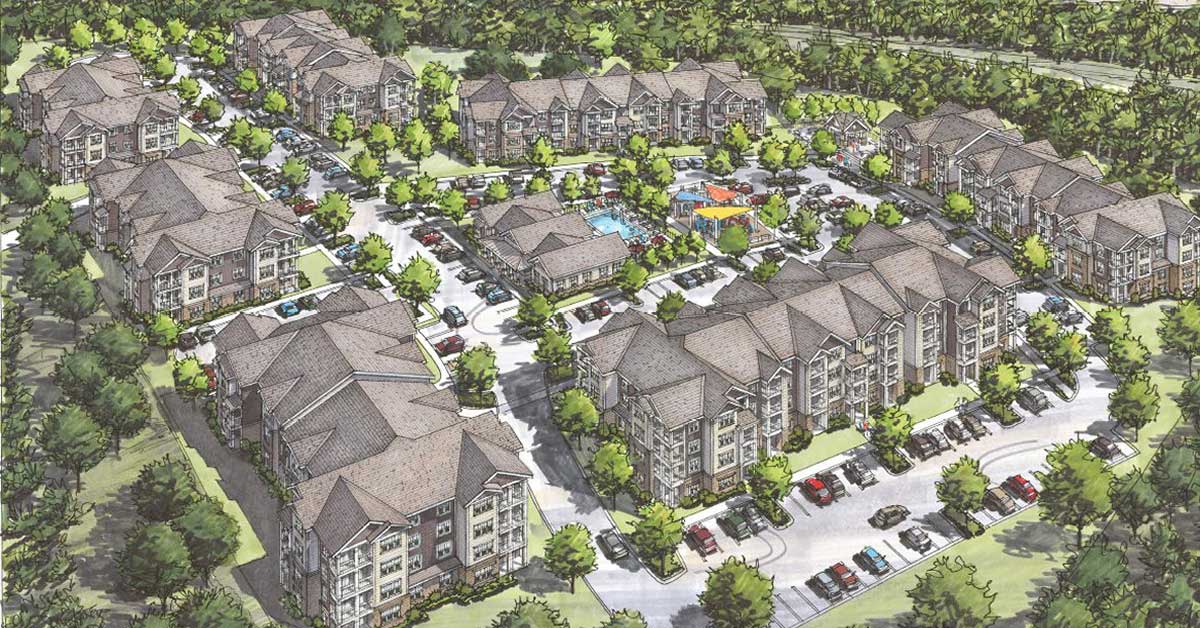 Artist Rendering of Dominium's Preserve at Highland Ridge. Image shown is for demonstration purposes only and may not be an exact representation of the final product.
Artist Rendering of Dominium's Preserve at Highland Ridge. Image shown is for demonstration purposes only and may not be an exact representation of the final product.Clarity About Workforce Housing Could Help with Affordability
Moren Adenubi is not your average REALTOR®, but even still, three years ago she wasn’t exactly sure how to properly define “workforce housing.”
A Certified Commercial Investment Member (CCIM) and a Certified Property Manager (CPM), Adenubi often tries to find commercial property for businesses, especially in the Nashville area where she is based as the managing broker for Crown Realty Experts in suburban Goodlettsville.
So, when she listed a property that Minnesota-based Dominium – one of the largest affordable housing development and management companies in America – was interested in developing for an apartment complex in Nashville to build 261 units of “workforce housing,” Adenubi had to up her game.
Not because she’s not educated in real estate, but because she didn’t realize the many trap doors that exist when trying to develop affordable housing, especially in hot markets like Nashville where home prices are rising faster than wages.
“I was very unaware of the income discrepancy for what it takes someone to rent,” Adenubi said.
According to WKRN news, in 2011 the average monthly rent for a two-bedroom apartment in Nashville was $825. In 2019, that price has nearly doubled to $1,536 per month.
That means that the average annual rent is $18,432. According to Adenubi, a newly hired teacher in Nashville metro schools who has a Master’s degree makes an average salary of $45,629 annually and therefore would not qualify to rent a two-bedroom apartment.
“It was shocking,” she said.
And it’s a problem across America, not just Nashville. Many teachers who are starting a job for the first time are looking for a place to live close to the school and many find they can’t afford to live there. As such, they must live much further away and endure lengthy commutes just to get to the job, and often they will leave after just a year or two, making teacher retention such a difficult task for school districts to manage.
But it’s not just teachers. A lot of middle-income folks face the same housing issues. Nurses. Police officers. Fire fighters. They can’t afford to live in communities where they work.
So, it made sense to Adenubi to work with Dominium to acquire her listing and to develop apartments in a city like Nashville where affordable housing has grown scarce.
Little did she know the fight she was going to be up against.
Dominium had placed a contract with zoning contingency on her listing – a tract of land for this development – which they called the Preserve at Highland Ridge – located on Dickerson pike about eight miles and a short 15-minute jaunt from downtown.
However, to develop this land, Dominium needed it to be rezoned. As such, a Zoning Board meeting commenced, and Adenubi was floored by what happened next.
“The people came out in droves to oppose this development,” she said. “I was stunned. Why would people be so opposed to building housing for middle-income earners?”
Adenubi quickly realized it was because of a lack of education on what exactly workforce housing is and a misguided belief about what workforce housing would bring to a neighborhood.
“They heard ‘workforce’ housing and they immediately thought it was Section 8 housing,” Adenubi said. “While some people who qualify for a Section 8 subsidy might end up renting apartments there, that’s not what’s going to happen with a majority of the units.”
These apartments would certainly be in line with the demographics of the neighborhood. According to Adenubi, the most affluent area in this part of Nashville is Mulberry Downs, where the top homes sell for approximately $250,000, which is basically the wheelhouse for middle-income homeowners.
But, juxtaposing “workforce housing” with “section 8” is what created a firestorm.
“Putting labels on these things is quite dangerous,” Adenubi said. “It became obvious that the community just needed to be educated better about this if we were ever going to make it happen.”
So, Adenubi reached out to former Nashville Metro Councilwoman Brenda Haywood because she represented the District that this new complex would be located, hoping to find an affordable housing champion.
Haywood told Adenubi that she completely understood what Adenubi was saying and that it made sense to her as an individual, but Haywood was reluctant to openly support the development, telling Adenubi it was her job to represent the people of her district and if they were opposed to it, then that’s what she had to support.
“I was impressed by that,” Adenubi said. “Too often, politicians have their own agendas. I respected her stance.”
However, Haywood, who left her position to join the staff for newly minted Mayor John Cooper, serving as deputy mayor for community engagement, wasn’t shutting the door completely, and worked with Adenubi to provide her with a list of objections to the development of this complex.
Haywood told her that if she could address the concerns of the constituents, she might be able to sway their opinion.
So, Adenubi went to work. She looked at the list of objections and worked with Dominium to find someone who could speak fluently against each one and had them attend a community meeting with many of the same residents who complained at the community meeting.
“We were well-prepared,” Adenubi said. “I had a whole team of experts who were there to address every concern.”
The biggest concern was the income levels of the would-be residents as well as the possibility to bring more crime into the community, as there is a direct link between an increase in crime and lower income.
 Adenubi put together a team of experts to address the community’s concerns.
Adenubi put together a team of experts to address the community’s concerns.To counter this, Adenubi worked with Dominium to bring in a Dominium resident manager to come in to speak about the application process, letting the residents know that not just anyone would be eligible to rent an apartment there. There is a vetting process that includes income confirmation as well as criminal background checks.
She also defined “workforce housing” for the uninformed public.
She told them that the Urban Land Institute defines workforce housing as “Housing that is affordable to households earning 60 to 120 percent of an area’s median income.” Housing can also be defined as affordable if the housing costs are no more than 30-40 percent of income.
“As a property manager, my company uses the lower 33.3 percent to qualify prospects on rent affordability,” she said. “The US Department of Housing and Urban Development (HUD) states that in 2018, $74,900 is the median income for Nashville, Tennessee.”
Dominion also brought in one of the architects to talk about the layout of the property. Residents were floored to learn that these apartments would have some unexpected luxuries.
The Preserve will feature spacious common areas with high-end finishes. The community consists of one, two, and three-bedroom apartments. The apartment community has breathtaking view of the National Forest Preserve to the northwest, and downtown Nashville to the south.
The apartments will have open and spacious floor plans, nine-foot ceilings, fully equipped kitchens with energy star rated appliances, smart cabinets, granite countertops, balconies and in-home washers and dryers.
Community amenities include a furnished clubhouse with clubroom, kitchen, a yoga studio, a fitness center, an indoor children’s playroom, an outdoor playground, grilling stations and a pool. With a combination of outdoor and indoor amenities.
“Preserve at Highland Ridge is Dominium’s first new construction development project in the state of Tennessee, and the company’s first project in the Nashville metro,” said Dominium Managing Partner and Senior Vice President Mark Moorhouse. “Once complete, the project will help address the growing shortage of affordable housing in Nashville.”
A representative of the Metro Water Department was also brought in to ensure existing residents that the addition of 261 apartments would not have an adverse effect on their water intake or water pressure.
“It was pretty amazing, their opinions changed immediately on the same spot – that same day,” Adenubi said. “The key was our preparation. We needed to legitimize the project with information, present the right people to provide the facts and address those issues.”
Eventually, the zoning was approved. Finally, three years later, after cutting through more red tape to get the financing necessary to secure this development, Dominium broke ground on the Preserve last May.
The expectation is that the apartments will be available to move-in by October 2020.
“I think we just need better education as to what workforce housing is,” Adenubi said. “It doesn’t matter what we call it, it’s still going to get a stigma without understanding. Rather than worry about the name, we need to make sure people understand that workforce housing is quite simply affordable housing for working people just like you and me.”
For her part, Adenubi is now championing this as a pet project of sorts in Nashville. She is working with Dominium to find the next location for affordable housing in Nashville, but she has also taken it a step further.
She went to the Apartment Buildings Complex and Expo in Pasadena, Calif. In September where she was networking with other builders and developers who might be interested in investing in affordable housing in Nashville.
“I started learning more about Opportunity Zones, Qualified Census Tracts and Difficult Development Areas, Low Income Housing Tax Credit Financing and other programs to attract developers to come to Nashville,” she said. “Nashville is one of the top 10 cities with increasing rents so, we’re not the only ones facing this affordability crisis.”
Time to Focus on Affordable Housing
Taxes on real estate are not the answer. Sign the petition calling on Congress to address our country’s housing shortage.





